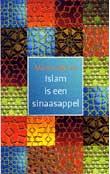3/28/2006
Let's stop using the word "Islam"

 "Let's stop using the word Islam in the coming period, for at least 3 months, that would be a good exercise"; is what Maurits Berger - writer of "The Islam is an orange" pleads for. I wrote about Berger before at this blog, I found the book that he wrote about his experiences with the Islam in Syria very good, because it's well founded and nuanced.
"Let's stop using the word Islam in the coming period, for at least 3 months, that would be a good exercise"; is what Maurits Berger - writer of "The Islam is an orange" pleads for. I wrote about Berger before at this blog, I found the book that he wrote about his experiences with the Islam in Syria very good, because it's well founded and nuanced.And now an article about him was published in the magazine Volzin, in which he says that we should stop talking about the Islam in the Netherlands, because the real problem is a problem of integration, not a problem of religion. The irony of his plea is that through this he nontheless focusses the attention to the Islam. The same counts for my blog, I also think that the Islam itself is not the real problem and still it seems to be the problem because I write about it very often in this blog.
Anyway, I found the article about Berger very good, so I will post a summary here:
Maurits Berger thinks that Holland doesn't really have a problem with the Islam, instead it has got an integration problem. In fact we islamificate the Netherlands ourselves. The West has always seen a threat in the emerging / growing Islam in the West, non-Muslims are afraid that Muslims will take over their world. Berger thinks that this fear is irrational. And from the other side Muslims have the same feeling; they fear the emerging West. Almost all Muslim countries have been colonized by the West and right now there are Western armies in these countries. So these countries feel threatened by the West.
Berger thinks that the fear for the other is unrealistic. Especially after 9/11 and after Pim Fortuyn and Theo van Gogh were murdered, the fear has grown in the Netherlands. At once people started to talk about "Muslims", while before they spoke reluctantly about "Turks and Moroccans". At once one million muslims were created. A group which was at first very fragmented - with regard to ethnicity, religion and language - was at once considered to be "the Islam". We give Muslims a common label of a single identity, while their identity is in reality pluralistic.
Slowly a dialogue is evolving between Muslims and non-Muslims, but according to Berger this dialogue very often goes wrong in practice. A constructive dialogue should be founded on a principle of equality, both sides should have an equal interest in the dialogue. But the dialogue is now mostly initiated by non-Muslims, they want to hear that they don't have to be afraid for the Islam. They only want to talk with Muslims as Muslims, while they might not want that themselves, maybe they would like to talk e.g. as a Moroccan or a single mother. We should not hold people accountable for their religion, unless they do so themselves. Not the non-Muslims but the Muslims should decide if they want to talk about religion or not. Maybe they prefer to be Moroccan, or Dutch, or a liberal. We want to focus all the time on what is written in the Quran, but there's a difference between written texts and how people act. How people act is what is important, independent of their personal background and independent of what is written in religious books from a long time ago. We shouldn't involve religion in the debate when it's in fact not relevant.
The real problem is a problem of integration, it's a problem of the social exclusion of certain groups in society. Immigrants are living here permanently and they can't leave. Are we going to accept them as full citizens or not? And then the question is in return: Do they want to become full citizens? We should focus on these topics, like integration and exclusion, and not too much on the Islam. Solutions should be found mainly at the level of the society. Especially at the level of local governments many improvements can be made. Bergers supports for instance the initiative of the local government in Nijmegen to work with anonymous job applications to stop discrimination.In the end what matters most are issues like employability and discrimination. For youngsters the issue at stake is not freedom of religion, but freedom of being, if they are able to really take part in the society.